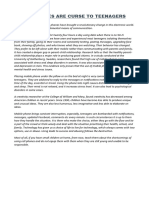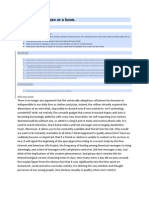Test 1: Technology and Social Interaction
Prompt:
In many countries, the use of mobile phones is becoming increasingly common. While mobile
phones offer many conveniences, they also have a negative impact on social interaction.
Discuss the advantages and disadvantages of mobile phone use on social interaction.
Key:
Introduction (Approx. 50 words):
The pervasive nature of mobile phone usage has transformed communication, offering
undeniable conveniences. However, this ubiquity raises concerns about its detrimental effects on
face-to-face social interaction, a critical aspect of human connection. This essay will explore
both the advantages and disadvantages of mobile phones on social interaction.
Body Paragraph 1: Advantages – Enhanced Connectivity (Approx. 150 words):
One significant advantage is the enhanced connectivity mobile phones provide. They allow
instant communication with family and friends, regardless of geographical distance. This is
particularly beneficial for maintaining relationships with those living far away. Social media
platforms accessible through mobile phones enable constant updates and shared experiences,
fostering a sense of community. For instance, individuals can stay connected with their social
circles through group chats, video calls, and instant messaging, thereby strengthening social
bonds.
Body Paragraph 2: Advantages – Facilitating Social Coordination (Approx. 150 words):
Mobile phones also facilitate social coordination. They enable quick and efficient planning of
social events, changes in schedules, and immediate updates. For example, arranging a
spontaneous gathering or notifying friends about delays becomes seamless. This efficiency
reduces the stress associated with coordinating social activities, allowing individuals to focus on
enjoying their time together. Furthermore, in emergencies, mobile phones provide a crucial
means of seeking help and informing others, ensuring safety and social support.
Body Paragraph 3: Disadvantages – Reduced Face-to-Face Interaction (Approx. 200
words):
Despite the advantages, mobile phones can significantly diminish face-to-face interaction. When
people are physically together, they often engage more with their phones than with each other.
This phenomenon, known as "phubbing" (phone snubbing), disrupts conversations and reduces
the quality of social interactions. For instance, family dinners or social gatherings can be marred
by individuals constantly checking their phones, leading to feelings of isolation and
�disconnection. This reliance on digital interaction can weaken the skills necessary for effective
face-to-face communication, such as reading non-verbal cues and maintaining eye contact.
Body Paragraph 4: Disadvantages – Social Isolation and Digital Distraction (Approx. 200
words):
Excessive mobile phone use can contribute to social isolation. Individuals may prefer virtual
interactions over real-life ones, leading to a decline in genuine social engagement. The constant
stream of notifications and social media updates can also be highly distracting, diverting
attention from the present moment and hindering meaningful interactions. For example, people
may become engrossed in social media feeds during social events, neglecting the people around
them. This can lead to a sense of detachment and reduced empathy, as individuals become less
attuned to the emotional needs of those physically present.
Body Paragraph 5: Disadvantages – Impact on Social Skills and Empathy (Approx. 200
words):
The over-reliance on mobile phones may negatively impact the development of social skills and
empathy. Children and adolescents who spend excessive time on their phones may miss out on
crucial opportunities to learn social cues and develop emotional intelligence through real-life
interactions. For instance, they may struggle to interpret facial expressions or understand
nuanced communication, which are essential for building and maintaining healthy relationships.
Furthermore, the anonymity and distance provided by online communication can reduce
empathy, as individuals may be less sensitive to the impact of their words and actions on others.
Conclusion (Approx. 100 words):
In conclusion, while mobile phones offer undeniable advantages in enhancing connectivity and
facilitating social coordination, their excessive use can significantly impair face-to-face social
interaction. The reduction in genuine social engagement, the distraction they cause, and the
potential negative impact on social skills and empathy are significant concerns. Therefore, it is
crucial to strike a balance between leveraging the benefits of mobile phones and preserving the
quality of real-life social interactions.







































































































